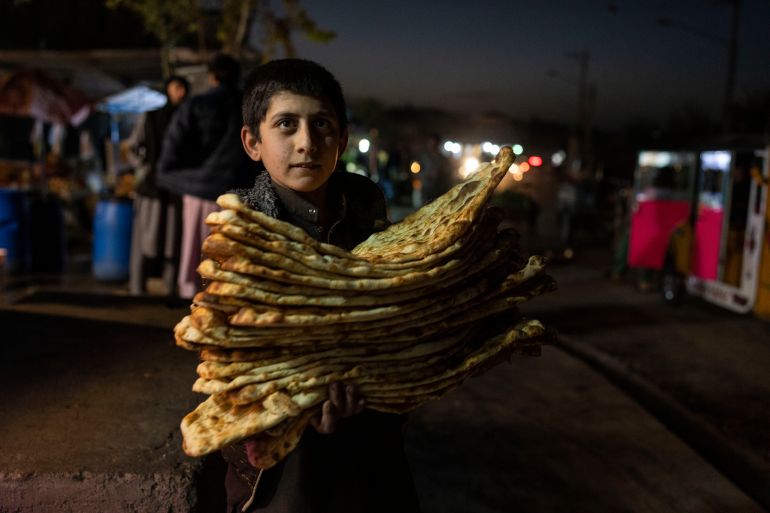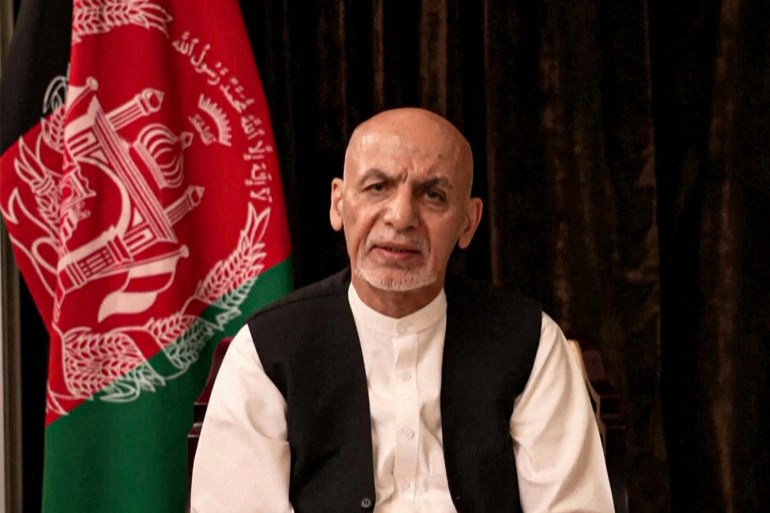Afghan officials fled to luxury homes leaving millions to suffer
Former officials from the Ghani administration escaped to luxury homes in Dubai and the US while millions of Afghans live in misery.

In the past few weeks multiple reports have emerged of Afghan elites and several former officials from the West-backed Kabul government escaping to luxury condos in Dubai and beachside villas in California during the Taliban takeover of the country last August.
But tens of thousands of Afghans, who also left the country, still languish in cramped refugee camps across the world, while back home, millions of others face hunger.
Keep reading
list of 3 itemsHe was a renowned comedian, Taliban threat forced him into exile
At least 1,000 killed after strong earthquake jolts Afghanistan
Last week, more than 1,000 people were killed and 10,000 homes were destroyed after a powerful earthquake struck southeastern Afghanistan.
Former Afghan officials, including aides of former President Ashraf Ghani, spent millions to buy properties in Dubai and the US during the last years of the West-backed government, according to a recent report by the Wall Street Journal.
A US watchdog said earlier this month that millions of dollars disappeared from the presidential palace and the National Directorate of Security during the Taliban takeover last August. The money remains unaccounted for, though Ghani unlikely fled with millions of cash, according to the watchdog.
The former president moved to the world-renowned five-star St Regis hotel in Abu Dhabi after leaving Afghanistan. He now lives in the UAE.
Tens of thousands of Afghans, who worked for the US and NATO forces, were airlifted as the US forces were withdrawing from the country after 20 years of war, but many of them are stuck in refugee processing centres across the world with an uncertain future.
Corruption and misappropriation of funds
The reports of corruption within the Afghan government and misappropriation of funds in the largely aid-dependent country put the spotlight on how Afghans – both refugees as well as those in the country – have been failed by their leadership.
“I gave the best years of my life to rebuilding this country, to educating the next generation of thinkers. And now here I am, vulnerable and unable to even support my own family, while those who did nothing for the country live comfortable lives,” said Mina, a university professor who wished to be identified by one name.

Mina built a career of more than 10 years, working as a respected professor and a prominent voice on women’s rights in Afghanistan. We are withholding the name of her university due to security reasons.
Her work has been severely affected owing to growing Taliban restrictions on women. Many of her classes have been cancelled, she has not been paid in months, and she often faces harassment from Taliban guards for going out without a mahram (male escort). Afghan girls still are barred from attending high schools and women are increasingly being excluded from public life, bringing back the memory of the last Taliban regime of the 1990s.
The Taliban has struggled to revive the war-battered economy after the West slapped sanctions, with the US freezing the Afghan central bank funds worth nearly $10bn following the withdrawal of US-led forces.
The financial crisis in the country has trickled into her household, and as her family’s sole breadwinner, Mina has been struggling to make ends meet on a significantly reduced and intermittent salary, with rising prices.
In the last 10 months, she was only paid twice and it was less than half of what she was owed.
“A year ago, cooking oil was 50 Afs [$.56] per kilo, and today it is over 150 Afs [$1.69]. A bag of flour was 1600 Afs [$18], but now it is over 4000 Afs [$45]. I haven’t been paid in months and have been borrowing money to feed my family (her parents and her younger sister). But even people won’t lend me any more,” she said, adding that on most days, they divide any meals they can acquire into two or more parts so that they have something to eat later.
“We are starving and I feel extremely hopeless, especially when I see that those who left us in this situation are living comfortable lives,” Mina, who is based in Afghanistan, told Al Jazeera.
Struggling to survive
Meanwhile, Afghans forced in exile and struggling to survive watch painfully as corrupt former officials escape accountability.
Dr Kamaluddin Koshan was a journalist based in Kabul before the Taliban takeover. He later worked to become a doctor to serve his people, but now he lives as a refugee in neighbouring Pakistan often dependent on doles and charity.
“I had a satisfying and honest income, but most of all I loved the work I did because it helped our country. I did not imagine this is where I would end up today,” 34-year-old Koshan told Al Jazeera, speaking from Pakistan where is currently living, after having escaped Taliban threats for his work.
As a refugee, Koshan, who was the regional manager of the North Zone of Khaama Press, a prominent Afghan agency, now shares a small, dingy one-room space with his wife and three children, all under the age of eight.
According to a European Union report released in May, there are more than 3 million Afghans living in Pakistan, of which 775,000 are undocumented and most of whom live in extremely inhumane conditions in informal settlements in the country. Most of them had fled due to the last four decades of conflict in the country.
As their savings dry up, Koshan’s family has struggled to make ends meet.
“I have no income to pay for rent, electricity or gas. Food is also sparse, and there are days we go to bed hungry. Sometimes my children ask me for fruits and I can’t even afford that for them,” he said, the exhaustion evident in his voice.
In the 20 years before that, Koshan said, he had worked hard to achieve every goal he set for himself.
“I also worked with many NGOs and Afghan civil society fighting injustice,” he said, beaming with pride as he narrated his life’s journey.
“Even my children have been out of school for months because I cannot afford to pay their fees. Every day that they miss education, their future is at stake,” he said.
While Taliban threats forced Koshan into exile, he blames corrupt Afghan officials equally for his misery.
“They [corrupt officials] looted everything that belonged to the country for 20 years. They appointed each other in influential positions, and then rewarded each other,” he said, his voice rising with anger.
“There was so much nepotism and discrimination among the elites, and absolutely no sense of loyalty towards Afghanistan,” he said.
Millions facing food insecurity
In fact, the US’s Special Inspector General for Afghanistan Reconstruction (SIGAR) John F Sopko had echoed similar concerns in grim warnings in June 2021.
“Corruption in Afghanistan is not just a criminal justice issue. Systemic corruption in Afghanistan goes beyond that… threat to the entire US mission and international effort in Afghanistan,” he said, warning the Afghan government to “get serious” about addressing corruption if it is ever to bring lasting peace to its people.
“Time is running out,” he had warned, just weeks before the collapse of the Afghan government of President Ghani.
More than 22 million Afghans are facing food insecurity, according to the UN’s World Food Programme, as the country stares at an economic collapse. Taliban’s diplomatic isolation has not helped the situation.
Khalid Payenda, the last Afghan minister of finance, who was mentioned in the Wall Street Journal report for owning properties in the US, has denied the allegations.
He has shared his financial records and sources of his assets on his Twitter handle.
Payenda, a whistleblower on several reports exposing corruption in the Afghan government, says Afghanistan’s corruption problem was widely-known and even exploited by many networks and stakeholders.
“Corruption was endemic in the sense that it existed not just at the national level but also the sub-national levels, and within all branches of the government, the executive, legislative and even the judiciary,” he told Al Jazeera.
Payenda shared similar assessments from his time within the government system.
“In one department, that was bringing in only one million afghani per month, far less than its potential, it increased significantly under my tenure,” he said.
Local news reports from last year confirm his claim, documenting a rise in customs collection – 330m afghanis collected daily in June 2021 as opposed to 180m afghanis per day in the previous quarter.
Koshan, who once placed a strong faith in Afghan democracy, is a disappointed man.
“I regularly voted in the elections and encouraged others to participate, thinking we could make a difference. But they lied to us,” he said bitterly.
“They told us to work for the country, even as they built lives abroad, and abandoned us the moment things got worse,” he said, making reference to the Afghan president’s escape on August 15, 2021 that triggered the collapse of the country.